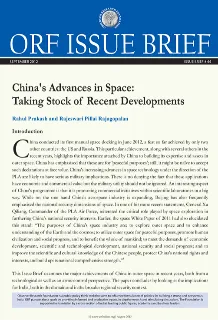China conducted its first manual space docking in June 2012, a feat so far achieved by only two other countries: the US and Russia. This particular achievement, along with several others in the recent years, highlights the importance attached by China to building its expertise and assets in outer space. China has emphasised that these are for ‘peaceful purposes’; still, it might be naïve to accept such declarations at face value. China’s increasing advances in space technology under the direction of the PLA are likely to have serious military implications.
There is no denying the fact that these applications have economic and commercial value but the military utility should not be ignored. An interesting aspect of China’s programme is that it is promoting commercial initiatives within scientific laboratories in a big way. While on the one hand China’s aerospace industry is expanding, Beijing has also frequently emphasised the national security dimensions of space. In one of his more recent statements, General Xu Qiliang, Commander of the PLA Air Force, reiterated the critical role played by space exploration in furthering China’s national security interests. Earlier, the space White Paper of 2011 had also elucidated this stand: “The purposes of China’s space industry are: to explore outer space and to enhance understanding of the Earth and the cosmos; to utilize outer space for peaceful purposes, promote human civilization and social progress, and to benefit the whole of mankind; to meet the demands of economic development, scientific and technological development, national security and social progress; and to improve the scientific and cultural knowledge of the Chinese people, protect China’s national rights and interests, and build up its national comprehensive strength.”
This Issue Brief examines the major achievements of China in outer space in recent years, both from a technological as well as an arms-control perspective. The paper concludes by looking at the implications for India, both in the domain and in the broader regional security context.
The views expressed above belong to the author(s). ORF research and analyses now available on Telegram! Click here to access our curated content — blogs, longforms and interviews.





 PREV
PREV



